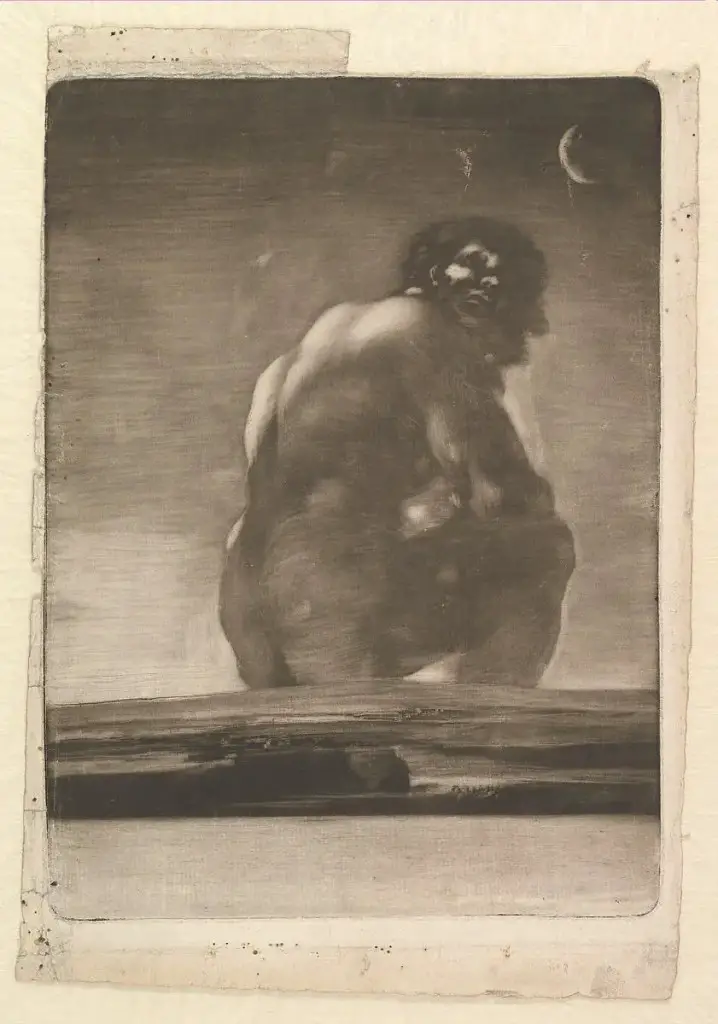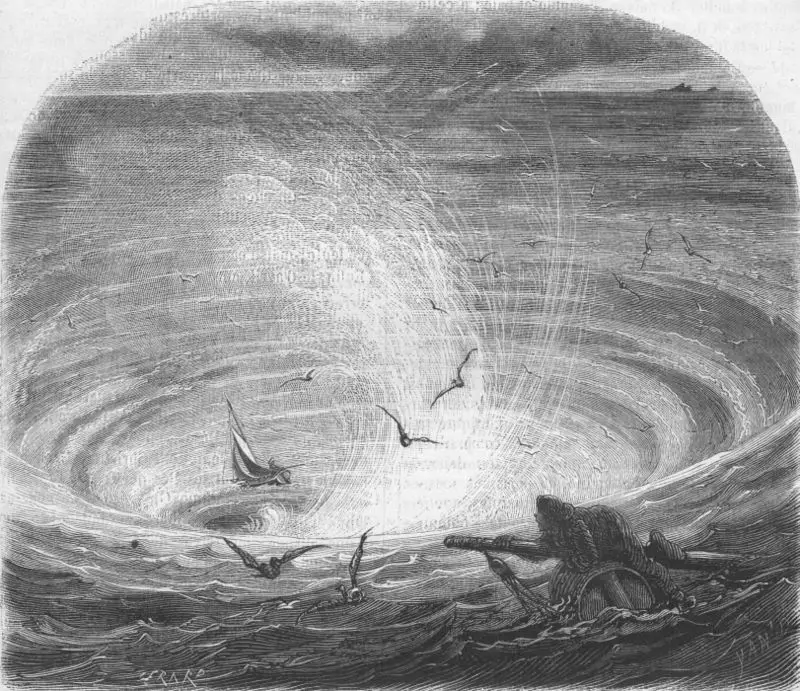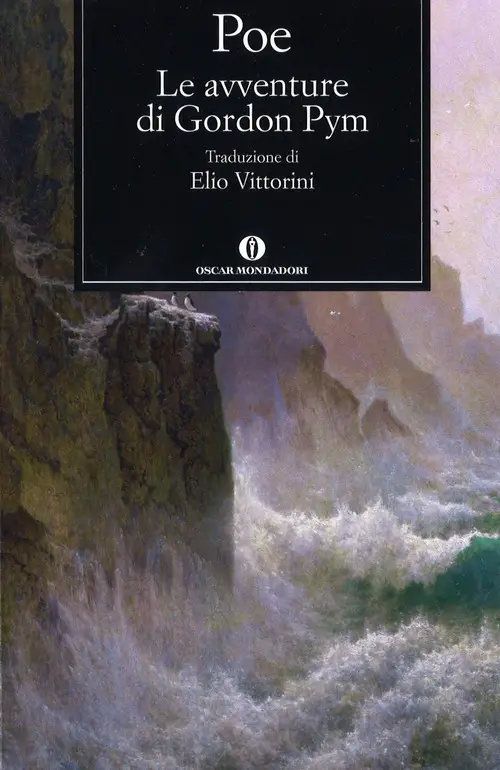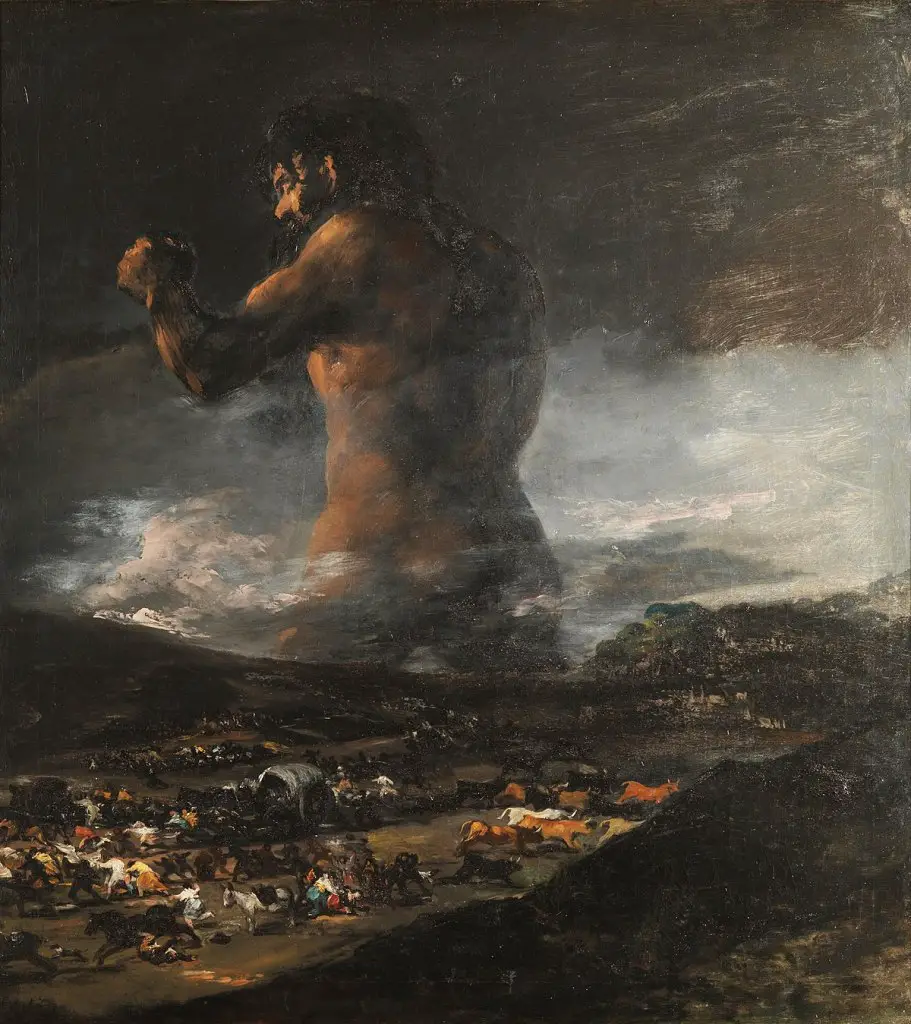Poe's typically romantic existential desperation arises precisely from this contrast: wanting to experience the infinite through the finite and the absolute through the relative; wanting to knock on the doors of mystery and access the secret of existence, without giving up the role of the rational investigator and the wayfarer who does not believe there are other paths to the truth, outside those recognizable by reason but who, nevertheless, warns and he senses that there is something else, perhaps an Unknown God, to approach which other tools and other mental attitudes would be needed.
di Francis Lamendola
Originally published on the Arianna Editrice website
The only novel written by Edgar Allan Poe, as is known, it is The Adventures of Arthur Gordon Pym (original title: The Narrative of Arthur Gordon Pym of Nantucket), published in 1838: account of an Antarctic navigation permeated with disquiet, horror and mystery, affected by the climate of enthusiasm for the first Antarctic discoveries by scientific expeditions organized by Russians, British, French and Americans.
The novel remains deliberately interrupted and its "open" ending has so excited the imagination of subsequent generations, that Jules Verne he wanted to write the sequel with The sphinx of ice. Towards the end of the work, in fact, the protagonist and one of his adventure companions, who an inexplicable warm sea current has brought beyond the barrier of floating ice, towards the open waters of the South Pole, glimpse, in the midst of the flight of countless white birds, a gigantic human figure rising on the horizon, of an unnatural whiteness, towering over them.
« 5 March. The wind had completely stopped, but we were still running southwards, carried away by an irresistible current. It would have been natural for us to feel apprehension about where things were going, but nothing. [...]
[translation by Elio Vittorini]
6 March. The steam had risen several degrees and was gradually losing its grayish tint. The water was hotter than ever, and even more milky than before. There was a violent stirring of the sea just very close to us, accompanied, as usual, by a strange flash of steam and a momentary fracture along its base. [...]
9 March. The strange ash-like substance continued to rain around us. The vapor barrier had risen over the southern horizon to a prodigious height, and was beginning to take on a distinct shape. I could not compare it to anything other than a huge cataract which fell silently into the sea from the top of some fabulous mountain lost in the sky. The gigantic curtain occupied the horizon in all its extension. There was no sound from it.
21 March. A mournful darkness hovered over us but from the milky recesses of the ocean a radiance rose and reverberated on the sides of the boat. We were nearly suffocated by the storm of white ash that accumulated on us and filled the boat as it melted in the water. The top of the cataract was lost in the darkness of the distance. In the meantime it was evident that we were running straight on it at an impressive speed. At times, on that endless curtain, wide slits opened, which however immediately closed again, through which, from the chaos of indistinct wandering shapes that stirred beyond, mighty but silent currents of air flowed that upset, in their whirlwind. , the inflamed ocean.
22 March. The darkness had grown more intense and only the luminous reflection of the waters of the white curtain stretched before us illuminated it now. A multitude of gigantic birds, bruised white, soared incessantly behind us to beat, as soon as they saw us, in retreat shouting the everlasting Tekeli-li. Nu-Nu [a native of the mysterious island of Tsalal whom the two had taken prisoner] had, at those cries, a movement on the bottom of the boat, and, as we touched it, we found that it had given its last breath. It was then that our boat rushed into the grip of the cataract where an abyss had opened to receive us. But a human figure with a veiled face appears on our path, of much greater proportions than any other inhabitant of the earth. And his skin color was the perfect white of snow. "

Poe's poetics are characterized, and can be seen clearly also in this page of prose, by a strange, fascinating mixture of romantic, dreamy, restless, sometimes grandly hallucinated spirit, and of cold, analytical lucidity, of apparently impersonal “scientificity”, almost in the sense that the French naturalists would have attributed to the term, a few decades later, on the basis of the aesthetic theories of Hippolyte Taine. Well, those who took the trouble to report on the map the route of Gordon Pym's ship across the oceans, had a surprise that was, to say the least, disconcerting: by joining the points, the outline of a large bird with the spread wings - like the mysterious white birds that, in the closing part of the novel, cry their incessant call to the south wind: Tekeli-li.
Is it a coincidence, a mere coincidence? But Poe loved very much decryption games, logical and linguistic puzzles: always in Gordon Pym, the protagonist discovers, engraved on the rock of the unknown island, apparently meaningless characters, but which will later reveal themselves to be words of ancient Egyptian, Ethiopian, Arabic which allude to unheard-of secret that lurks in the region of the Antarctic pole. And this passion for charades, for puzzles, for the practical application of a rigorous mathematical logic is fully revealed in the trend of detective stories, particularly in The crimes of the rue Morgue, no The golden beetle, no The stolen letter. You remember, perhaps, his studies at West Point, at the time of the brief and unsuccessful attempt to make a career in the military; but, without doubt, also personal interest, attraction towards that particular form of mystery that the human mind can, under certain conditions, decipher.
Yet, in the finale of the Gordon Pym Poe seems to throw in the towel: his gives up describing the mystery seems to correspond to the recognition that not everything is susceptible to a rational explanation and that there are truths that the human soul can indeed experience, but which cannot be told in words, because there is no language capable of describing them, as well as there is no intelligence capable of penetrating them fully.

A bit like Ulysses Dante's destiny to end his "mad flight" in the storm who will make it sink precisely in view of the mountain of Purgatory, a symbol of redemption from sin by divine Grace (and which, therefore, cannot be reached by human means alone or, worse, with human pride), also Gordon Pym goes so far on the path of knowledge that he goes beyond what reason and speech can express; luckier than his predecessor, however, he manages to return home from the "world without people", no one knows how, and to narrate his extraordinary adventure, at least until the fateful date of 22 March.
In literary fiction of the "Introductory Note" to the novel, attributed to Gordon Pym himself, Poe tells the latter that he has decided to tell his own travel experience in the southern seas at the urging of some Virginian gentlemen and particularly the former director of the "Southern Literary Messenger" in Richmond, Mr. Poe, who, initially and with his authorization, had published an advance for the public.
But because the story stops at the most enigmatic moment, when the supernatural makes its appearance within a narrative which up to that moment, despite having to deal with extremely dramatic experiences and bordering on the incredible, had never strayed from a tone of studied, rigorous objectivity? It is purely and simply a literary device to increase the reader's curiosity, leaving them unsatisfied at the best; or is there a more intimate and profound reason?

We favor this second possibility: that, that is, that the novel's ending remains "open" due to the difficulty, or rather to the impossibility of reporting something inexpressible or, perhaps, something you don't must to be said, something so shocking, so secret, that disclosing it would be contrary to a very specific moral command. A command from one's conscience, or a command from an external source? Difficult, if not impossible, to say. But here are the interesting reflections made on the subject of Maurice Vitta:
«Among Poe's works, two in particular can be compared to the“ Gordon Pym ”so as to constitute with it a kind of trilogy:“ A descent into the Maelström ”and“ The manuscript found in a bottle ”. The common elements are the sea, the shipwreck, the drift, the expectation of discovery, the fall, the unstoppable fall. In all three stories the story has an eschatological trend: in the first one escapes the mortal suck through the cold and desperate use of reason, which makes it possible to exploit the very laws of the triggering force; in the other two, the ineluctability of cosmic phenomena becomes mortal, because all the rules of them are ignored for the moment. Mystery, for Poe, is never the unknowable, but the unknown. Even in "Gordon Pym" the narrator warns from the beginning that everything will end with "episodes of such an exceptional nature and so beyond the limits of human credibility" as to be trusted only "in time and in the progress of science" so that they can find confirmation. Thus, entering an increasingly enigmatic and disturbing world results in the same anxiety of discovery as the fisherman sucked into the Maelström and who in the end exalts the anonymous castaway of the "Manuscript", a prisoner of the gigantic vessel launched by his own internal fury towards the sea precipice. Compared to these two characters, Pym reaches the final mystery through more complex events, which, although not always happily resolved on the literary level, are also composed in a sort of initiation ritual: from the agony in the cove to the fight against the mutineers, from the episodes of hunger, cannibalism and death (and here the terrifying appearance of the Dutch vessel full of corpses is particularly noteworthy), up to contacts with the mysterious savages of the island of Tsalal. It has been rightly said that these pages reproduce the myth of the passage from adolescence to maturity, recurring in the works of Melville, Twain, James, Stevenson or Conrad, with different accents and outcomes. In Poe, however, maturity is always an individual experience, a DISCOVERY, in fact, destined to annihilate the one who reaches it. "
cit. in the'Introduction to Gordon Pym by Elio Vittorini, Mondadori, 1981, pp. VIII-X
Pym, apparently, does not die when his is finished adventure among the eternal ice. But in the end nothing is known about him and Peters, and Poe deliberately keeps the story in an atmosphere of ambiguous reticence. Expedient of a great master, no doubt: but also fidelity to a conception of life and literature that has never abandoned him.

It is no coincidence, therefore, that the story of Gordon Pym was then taken up, over time, in a series of attempts at explanation. Jules Verne, in his Sphinx des glaces, retraced the poetic itinerary, eventually finding Pym's skeleton nailed to the magnetic pole, in a story in which the desire, typical of his culture, to explain every mystery with the cold light of positive science shines through. Much later it was HP Lovecraftin At the mountains of madness, the theme of the mysterious Antarctic continent, in a story that makes those regions the seat of primordial fearful beings filtered by the steles when the earth still did not know man, and of Poe a sort of initiate to those mysteries. And again in 1947 the story of Arthur Gordon Pym resurfaced in a novel by Dominique Andre, La conquete de l'eternel, whose protagonist returns among those ice, discovering in the terrible creature with a veiled face an image of Saturn already evoked by Virgil and invoked today by a humanity prostrated by wars and fratricidal struggles.
All themes, as we can see, ranging from scientific to philosophical up to science fiction, and which coexist and intertwine in Poe's work, making it the point of origin of many contemporary literary strands. Why the discovery, in Poe, it is always a literary discovery, that is revelation through the word. For certain spirits it is not enough, as he himself wrote in the "Marginalia", that a certain thing is done: it is necessary for them to know and show that it has been done. Knowing and making known, expressing and transmitting in words the complexity of existence which, in the end, will find its own symbol: this is, for Poe, the function of literature.
Thus, in the concluding episode of the Gordon Pym, in that “sort of symphonic finale worthy of the purest Wagner", As Emilio Cecchi defined it, the white of the ice, and the same milky aspect of the sea, repeatedly observed in the polar expeditions, are composed in a terrible and inviting symbol that sums up not only an entire human story, but also what, for Poe, is his destiny, an annihilation that is perhaps the passage to that kind of "spiritual materiality" which he described in "Magnetic Revelation" and which constituted one of the cornerstones of his secular religion. The white of that hallucinatory landscape and of the gigantic figure towards which Pym's canoe falls unstoppably transcends its materiality without however ever losing it, because it is embodied in the word. For this reason the two phenomena - the natural one and the imaginary one - can coexist without forcing. In fact, one is but the projection of the other, and both express, through the verbal symbol, the same reality.
Poe-Pym, therefore, interrupts the narration of the novel because human language cannot say what he saw and experienced at that extreme juncture, while his boat was relentlessly sucked into the extreme southern latitudes. Maybe it was an experience of higher consciousness, of a kind of mystical experience, but of a lucid mysticism, such as that of conscious and guided dreams; a mysticism such as a man could conceive and experience it who, like Poe, did not really believe in an afterlife, but in a sort of sublimation of the nowhere; a man who, addicted to reaching altered states of consciousness by means of copious doses of alcohol and drugs, believed that the door of mystery may open not so much to the authentic spiritual seeker, but to the determined and rational man, armed with confidence in science and its extreme resources.

After all, the Poe's existential despair, typically romantic, arises precisely from this contrast, which will also, incidentally, be the same as Nietzsche: wanting to experience the infinite through the finite and the absolute through the relative; want to knock on the doors of the mystery and access the secret of existence, without abandoning the role of the rational investigator and the wayfarer who does not believe there are other paths to the truth, outside those recognizable by reason but who, nevertheless, warns and senses that there is something else, perhaps a Unknown God, to get closer to which other tools and other mental attitudes would be needed.
This, perhaps, represents the giant veiled figure, white as snow, which looms and soars above Gordon Pym in the last image of the novel: an Unknown God, towards which Poe's soul reaches out, but of which he will not be able to report anything, because he literally does not have the means, cognitive and linguistic, to do so. A God who, in its tremendous and icy splendor, coincides with the blinding or destruction of man; a God who is not love, nor pity, nor anger or anger, but simply something else: other than everything that the human mind and heart can come to conceive, understand and tell.
